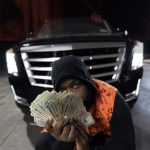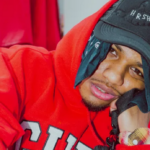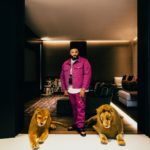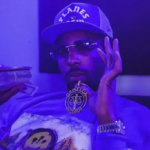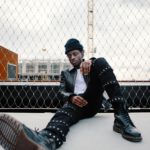Black Noi$e prefers controlled chaos. The Michigan producer/DJ, born Rob Mansel, was raised in the circle pits and sweaty raves of Detroit’s music scene. Rap, hardcore, ghettotech, and house pulsed through his radio speakers and facilitated a sense of belonging.
“That feeling of going to shows was unmatched,” Black Noi$e explains over the phone. “I couldn’t find this nowhere else; that sense of everyone being in the same place for the same reason.”
Unfortunately, the feeling responsible for jumpstarting Black Noi$e’s omnivorous production style isn’t easily achievable in 2020. The coronavirus continues to stall the live music scene indefinitely—at least in the United States—by relegating concerts to live streams and chat rooms. When I ask him about the meaning behind OBLIVION, the title of his major-label debut album releasing August 14 via Earl Sweatshirt’s Tan Cressida Records, Black Noi$e reveals the album congealed as a response to the pandemic.
“[The pandemic] made me want to tie everything together and make a cohesive story out of the album, even though it’s all different artists,” he says. “I’m just trying to make it all work together.”
The melange of sounds and textures across OBLIVION lurch and morph in unexpected ways. Single “The Band” melts into a dreamy shoegaze sludge given form by soft coos from Dallas vocalist Liv.e. “Glitch,” and the album’s title track is a gleaming dance workout bound to Earth by Duendita’s swelling voice and Pink Siifu’s focused raps, respectively. Elsewhere, on “Mutha Magick,” Tennessee rapper Bbymutha raps confidently over a beat that sounds like a computer virus having a manic episode.
OBLIVION is an abrasive album, its songs noisily scraping against each other to create hauntingly beautiful friction. Black Noi$e’s debut speaks directly to the times like few albums currently do, channeling the frenetic energy of a tactile world forced into isolation. A promo video uploaded earlier this week—a supercut of footage from tours and hangouts between Black Noi$e and friends—drives this idea home.
OBLIVION is a mini-festival for the end of the world. Our conversation about the album, lightly edited for content and clarity, follows below.
DJBooth: You grew up listening to rap and hardcore. What was it about those genres that attracted you to those scenes?
Black Noi$e: I really fucked with the beats when I was younger. One of the first things I noticed was, “Damn, these beats are hard.” That feeling of going to shows was unmatched. I couldn’t find this nowhere else; that sense of everyone being in the same place for the same reason.
The first beat I heard that I thought was crazy, and this is showing my age a bit, was that Mystikal “The Man Right Chea” shit. And I was into a lot of E-40 at the time, too. Those beats kicked it off before I even knew where it was coming from.
Detroit is also a hub for house and techno music. When did you first fall in love with those genres?
[DJs] would play these mixes late at night on the radio. After 10 p.m., 105.9 and 97.9 would be live from the club playing ghettotech. And on Sundays, the Chicago DJs would be playing all the gospel house and all that. The groove was different. It was infectious, and like them beats from before, it sounded new to me and intrigued me.
Gospel house, huh?
We gettin’ turnt up for the Lord, man. [Laughs] Going back to parties, that same energy from the hardcore shows was in these sets. Just to get away for a minute and feel the music.
How did your omnivorous music taste inform your production?
When I first started, I was trying to figure out what other people were doing and how they were doing it, too. Just learn the little techniques and figure out why people did certain things they did. I was recreating until I could find my own way of making it to the point that I could actually show it to somebody.
What inspired you to name your major-label debut album OBLIVION? What oblivion are you referring to?
Life in general at this moment. It’s up in the air; nobody knows what’s going on or what’s gonna happen. We’re still moving with it, but we just have no idea.
So this wasn’t a name you had in mind while making the project?
I started putting [OBLIVION] together once everything kicked off. [The pandemic] made me want to tie everything together and make a cohesive story out of the album, even though it’s all different artists. I’m just trying to make it all work together. OBLIVION came from that and being where we’re all at now. It all just fell into place.
It’s interesting you mention a story. OBLIVION flows like an extremely hectic DJ set with harsh transitions. When most people think of DJ sets, they think of smooth transitions between songs. I respect the fact that OBLIVION is decidedly not that.
[The sequencing] is like the times right now. Everything changes so quickly now. The flow isn’t so structured, but I wanted it to work still. It’s like my DJ sets, too. When I DJ, it’s not a certain flow. It just switches up. It can go left quickly, so I put [OBLIVION] together the same way.
I appreciate seeing artists like ZelooperZ, Bbymutha, MIKE, and Duendita on a major-label release. Did giving artists like these a major platform factor into how you made OBLIVION?
It wasn’t a thought-out choice. I just knew I was gonna be fucking with these people, regardless. Honestly, I felt the same way being on Warner Records. It blows my mind. I wouldn’t have thought I’d be here a few years ago.
OBLIVION is also the first non-Earl Sweatshirt album being released through his Tan Cressida imprint. That’s a pretty significant co-sign. How did your relationship lead to you releasing this album through the imprint?
It just came together through the music. As you said, I’ve been around; that’s my brother. [Earl] approached me and said he wanted to put something out in the future. We’ve been talking about it for a long time. While putting [OBLIVION] together, I felt like I could present it to bro in a certain way and just roll with it. It’s a blessing. I appreciate bruh.
OBLIVION is a very fast ride, barely clocking in at 20 minutes. It’s indicative of a quote from your interview with The Hundreds: “I like raw beats, I don’t like all the flash. I like getting straight to the point.” Do you still prefer this approach?
It’s definitely no big frills on [OBLIVION]. It’s minimal in that sense. Everybody says what they wanted to say on this album, and I just wanted to get to that point as [quickly] as possible without fooling around with it. It’s in your face. That also stems back to the DJ set. It’s not flash or sparkles; it’s right there, and it’s laid out for you in the quickest sense. I just like raw shit. That’s the type of music I listen to. That’s the only way I can maneuver through this.
Your sound isn’t very indulgent. You state your business, take the listener for an intense ride with your friends, and then it’s over.
All the songs feel like family, man. That’s another good part about having all my friends and people I respect in music on this album. There’s not a point where I did anything because of any outside reason other than them being people I respect musically [and] in real life.
In that sense, OBLIVION reminds me of the most hectic summer barbecue ever. It feels like a tangible connection to outside in the wake of COVID robbing us of a proper summer.
That’s what I was scared of at first. It felt weird to promote music in general or anything that’s not what’s going on right now because I feel it’s important to speak to that. But at a certain point, you just need to put that energy out there because it’s a lot to hold on to. I’m glad I had the opportunity. Gotta keep going forward and shed some hope on the situation.
The beats on this album range from straight boom-bap to glitchy techno to fast-paced house. How do you feel your sound fits into a modern music scene where genre-blending has become the norm?
It’s not even a part of a scene. It’s something I’ve been doing since I started making music. I’ve never wanted to be tied down to one thing like, “I have to make this.” I was an only child, so I had to experiment with myself, and that was the foundation. It’s not a new concept for me. I’m not putting effort into making things different. It just flowed out in this organic process.
To me, [the music] don’t even sound different. That’s how I approach music in general. I’m never thinking about listening to this type of music or that type of music. Music blends into itself at a certain point. That’s another reason I started DJing. I wanted to present music to people in a way that proves you can do whatever you want. Music is music. It’s not tied down to any one genre, and it’s not a new concept to make this “extreme” or whatever. That’s how I approach listening to and making music.

